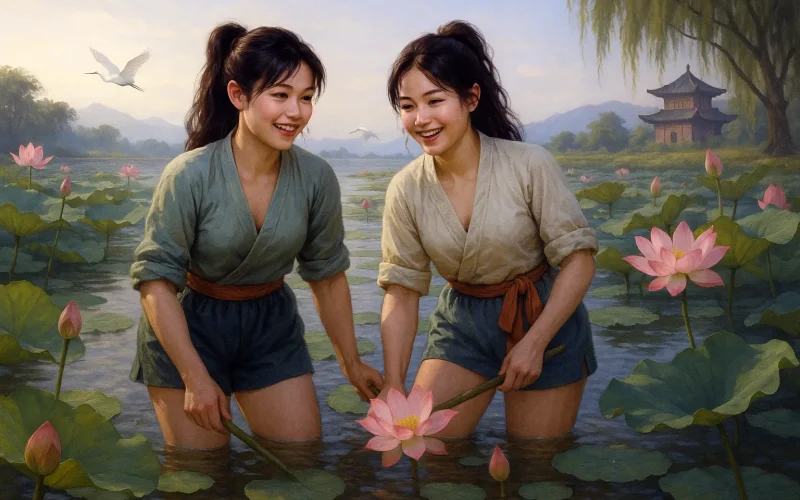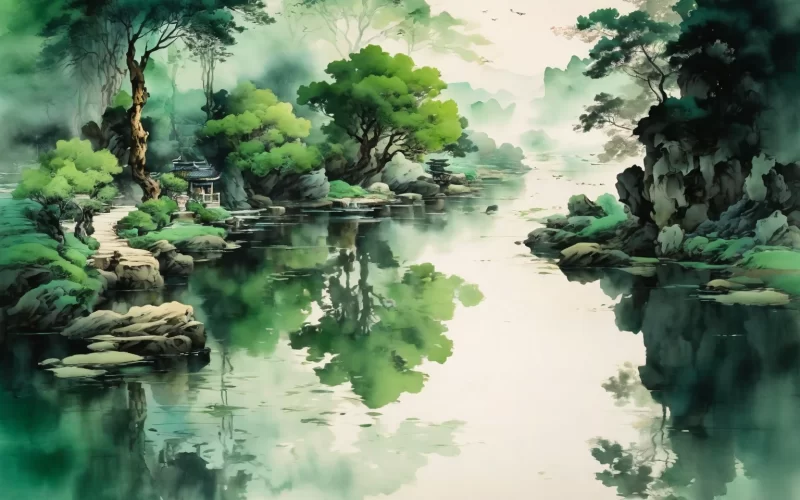The lotus-gathering girls by riverside
Gaily chatter with lotus flowers between.
The sunlit water mirrors their beauty bright;
Their perfumed sleeves waft with the breeze green.
On the shore there are young gallants on the horse,
Two by two and three by three seen ’neath the willows grey.
Their purple steeds neigh, going through flowers fair,
At the sight they’d stand still, heartbroken, they’d stay.
Original Poem
「采莲曲」
李白
若耶溪傍采莲女,笑隔荷花共人语。
日照新妆水底明,风飘香袂空中举。
岸上谁家游冶郎,三三五五映垂杨。
紫骝嘶入落花去,见此踟蹰空断肠。
Interpretation
Composed during Li Bai's travels in the Wu-Yue region, this poem vividly captures the enchanting scenery of Jiangnan water towns and youthful sentiments through his characteristic romantic brushwork. Beneath the seemingly cheerful lotus-gathering scene, however, lies the poet's keen sensitivity to the transience of beauty, interwoven with a faint melancholy born from his own career setbacks and the passage of time. This work thus becomes a bright yet sorrowful ode to youth.
First Couplet: "若耶溪傍采莲女,笑隔荷花共人语。"
Ruòyē xī bàng cǎilián nǚ, xiào gé héhuā gòng rén yǔ.
By the Ruoye Stream, lotus-gathering girls laugh and chat across the blooming flowers.
The opening draws readers into an audiovisual tableau. "Ruoye Stream" is not merely a geographical marker but also the setting of the legendary West Lake tales, imbued with classical romance. "Laughing across the flowers" is inspired: the lush lotus flowers act as a visual screen, creating a "half-hidden behind the pipa" subtle beauty, while serving as an acoustic medium that makes the girls' lively chatter more penetrating, adding vitality and mystery to the scene. Their innocence and vivacity leap off the page.
Second Couplet: "日照新妆水底明,风飘香袂空中举。"
Rì zhào xīn zhuāng shuǐ dǐ míng, fēng piāo xiāng mèi kōng zhōng jǔ.
Sunlight illuminates their fresh attire, mirrored brightly in the water; Breeze lifts their fragrant sleeves, waving in the air.
This couplet elevates the depiction of the girls' beauty through light and movement. "Sunlit fresh attire" is a realistic top-down portrayal, highlighting their radiance; "mirrored brightly in the water" is an ethereal reflection from below, where shimmering ripples add a dreamlike quality. "Breeze lifting fragrant sleeves" blends vision (fluttering), touch (breeze), and smell (fragrance) synesthetically, shaping figures who resemble nymphs dancing on water rather than laborers.
Third Couplet: "岸上谁家游冶郎,三三五五映垂杨。"
Àn shàng shuí jiā yóu yě láng, sān sān wǔ wǔ yìng chuí yáng.
On the bank, young gallants stroll in threes and fives, their figures dappled through the weeping willows.
The poet skillfully shifts perspective from water to shore, introducing the other half of youthful affection. The appearance of "young gallants" creates a subtle viewer-viewed dynamic. "Dappled through weeping willows" is highly expressive: the willow branches not only signify the Jiangnan region but also, with their swaying forms, mirror the restless hearts of the youths, subtly conveying their hesitant shyness and admiration.
Fourth Couplet: "紫骝嘶入落花去,见此踟蹰空断肠。"
Zǐ liú sī rù luòhuā qù, jiàn cǐ chíchú kōng duàn cháng.
My purple steed neighs and treads through falling blossoms; Witnessing this scene, I linger, heart aching in vain.
The concluding couplet functions as the poem's emotional and philosophical turning point. The earlier tranquility is ruptured by the kinetic energy of "steed neighing," while "falling blossoms" emerge as an epistemological jolt, emblematic of youth's ephemerality and glory's inevitable decay. The poet's stance as observer manifests in "lingering" and "vain heartache"—complex affects comprising envy of the youthful tableau, introspection on his nomadic life, and metaphysical mourning for beauty's dissolution. This layered "heartache" transcends the work from descriptive genre painting to ontological meditation on existence and time.
Holistic Appreciation
This poem exemplifies Li Bai's masterful synthesis of folk song spontaneity and literati introspection. Its structure unfolds like a miniature drama: the first six lines form a vibrant tableau showcasing lotus-gatherers' charm and youthful affection, brimming with vitality; the final couplet abruptly shifts to a second act where the poet, as an "outsider," intervenes, casting a tragic veil over this youthful scene through "falling blossoms" and "heartache." This emotional transition from immersion to detachment, joy to sorrow, generates powerful artistic tension, revealing Li Bai's profound love for beauty and his eternal lament over life's impermanence.
Artistic Merits
- Multisensory Three-Dimensional Description: The poem integrates vision (fresh attire, water reflections), hearing (laughter, chatter, neighing), smell (fragrant sleeves), and touch (breeze) to build a tangible, vivid world.
- Use of Contrast and Foil: The dynamic labor of the girls contrasts with the static observation of the youths; the scene's overall joy contrasts with the poet's personal sorrow, using the former's "joy" to heighten the latter's "grief."
- Deliberate Selection and Combination of Imagery: "Lotus flowers," "fresh attire," and "weeping willows" collectively create an atmosphere of youth, beauty, and vitality, while the sudden intrusion of "purple steed" (symbolizing wandering) and "falling blossoms" (symbolizing fade) abruptly twists the mood, producing strong artistic impact.
- Skillful Narrative Perspective Shift: The poem transitions from an omniscient, objective description to a first-person lyrical voice in its conclusion, creating a natural progression from objective narration to subjective emotion that deepens the thematic resonance.
Insights
This poem reveals an eternal paradox of existence: the more sublime the beauty, the more it evokes the dread of its loss and the sorrow that follows. Li Bai teaches us not to refrain from appreciation for fear of loss, but to embrace and cherish each beautiful moment with heightened passion, even when it brings "heartache in vain." It reminds us that life's value lies not only in experiencing joy but also in profoundly perceiving the transience underlying it, thereby cultivating compassion and reverence for life itself. Amid our fast-paced modern lives, we might occasionally pause to become "lingering" observers—discovering, appreciating, and treasuring the ordinary yet poignant "lotus-gathering scenes" around us, allowing these fleeting beauties to become eternal memories that defy time's nihilism.
About the poet

Li Bai (李白), 701 - 762 A.D., whose ancestral home was in Gansu, was preceded by Li Guang, a general of the Han Dynasty. Tang poetry is one of the brightest constellations in the history of Chinese literature, and one of the brightest stars is Li Bai.












